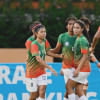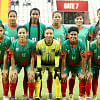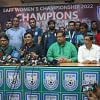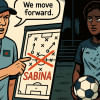Take a bow - Women in red and green

What started as an experimental idea less than two decades ago against the backdrop of heavy resistance from sections of a conservative society helped Bangladesh lift the biggest prize in South Asian football since 2003 as Bangladesh clinched the title of the SAFF Women's Championship, beating Nepal 3-1 in an entertaining final in Kathmandu yesterday.
The history of women's football in Bangladesh is not that old, but it has been fraught with as many hurdles as it has been blessed with achievements. Against many obstacles, Bangladesh's young girls continued to win accolades in South Asia and beyond at the age-group level.
Finally, the girls who had sparked a resurgence in the country's otherwise success-deprived football, claimed the biggest prize of all by winning the SAFF Women's Championship with a commanding performance in front of a capacity crowd at the Dasarath Rangasala in the Nepalese capital last night.
A 14th-minute flick from substitute forward Shamsunnahar Jr and two expert strikes from Krishna Rani Sarkar propelled Bangladesh to the trophy, which India had monopolised in the first five editions.
Bangladesh conceded a goal in the 70th minute as the hosts upped the ante after going down 2-0 in the first half, but Krishna's 77th minute strike wrapped up a richly-deserved victory for Golam Rabbani Choton's charges, who scored 23 goals in the campaign while conceding only one.
The victory was a long time in the making. Every time Bangladesh had won an age-level title, one question was thrown at coach Choton, who has been in charge of all women's teams since 2010. The question was when we would see the senior team dominate South Asian football like the juniors.
Each time Choton came up with the same answer: "Wait a few more years for the young players to mature so that they can compete better against India and Nepal. We will eventually win the title."
Choton's expectations and that of millions finally came true in this tournament, where Bangladesh had played like champions right from the first match, when they beat Maldives 3-0.
With each match, Bangladesh showed improvement. They thrashed Pakistan 6-0 before ending the group stages with the biggest victory of all, a 3-0 win against India, who had thus far remained unbeaten in the competition's 12-year history.
The win against India came as a massive shot in the arm for Bangladesh, who thrashed Bhutan 8-0 in the semifinals. There was still one final hurdle left in the form of Nepal, whom Bangladesh had never beaten in eight previous meetings.
While there were moments in the final when Nepal put Bangladesh under pressure, the women in red and green looked in control and were mighty clinical in front of goal -- each of the three goals had class written over them.
It was such a collective effort that when Bangladesh lost their lethal striker Sirat Jahan Swapna to an injury in the 10th minute, it didn't temper any of their confidence. Shamsunnahar Jr, who replaced Swapna, only took four minutes to set the tone for Bangladesh's victory.
The girls who had sparked a resurgence in the country's otherwise success-deprived football, claimed the biggest prize of all by winning the SAFF Women's Championship. Bangladesh 3 Nepal 1
Bangladesh were so dominant throughout the campaign that they bagged all the major accolades of the tournament -- Sabina winning both top scorer [8 goals] and most valuable player, Rupna Chakma winning the best goalkeeper award and Bangladesh winning the fair play award.
The Dasarath Rangasala in Kathmandu is an iconic venue to all Bangladesh football fans. It was at this venue that Bangladesh men's team had won their first big regional title -- the football trophy in South Asian Games back in 1999 -- by beating hosts Nepal 1-0.
Although none of the members of this team were born at the time barring 28-year-old Sabina, the players drew inspiration from that victory in their own endeavour. Choton's charges have successfully done it, in some style too.
And there is every reason to believe that this team will continue to dominate the region and beyond for years to come.

 For all latest news, follow The Daily Star's Google News channel.
For all latest news, follow The Daily Star's Google News channel. 








Comments